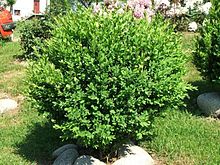bush (noun) /bʊʃ/

(horticulture) A woody plant distinguished from a tree by its multiple stems and lower height, being usually less than six metres tall; a horticultural rather than strictly botanical category.
A shrub cut off, or a shrublike branch of a tree.
(historical) A shrub or branch, properly, a branch of ivy (sacred to Bacchus), hung out at vintners' doors, or as a tavern sign; hence, a tavern sign, and symbolically, the tavern itself.
(slang, vulgar) A person's pubic hair, especially a woman's.
(hunting) The tail, or brush, of a fox.
(often with "the") A noun "bush" represents tracts of land covered in natural vegetation that are largely undeveloped and uncultivated, specifically referring to the countryside area of australia, areas of new zealand covered in forest, and the wild forested areas of canada.
(Canada) A woodlot or bluff on a farm.
(baseball) Amateurish behavior, short for "bush league behavior"
A thick washer or hollow cylinder of metal.
A mechanical attachment, usually a metallic socket with a screw thread, such as the mechanism by which a camera is attached to a tripod stand.
A piece of copper, screwed into a gun, through which the venthole is bored.
bush (verb) /bʊʃ/
(intransitive) To branch thickly in the manner of a bush.
To set bushes for; to support with bushes.
To use a bush harrow on (land), for covering seeds sown; to harrow with a bush.
To become bushy (often used with up).
(transitive) To furnish with a bush or lining; to line.
bush (adjective) /bʊʃ/
(colloquial) Not skilled; not professional; not major league.
bush (adverb) /bʊʃ/
(Australia) Towards the direction of the outback.